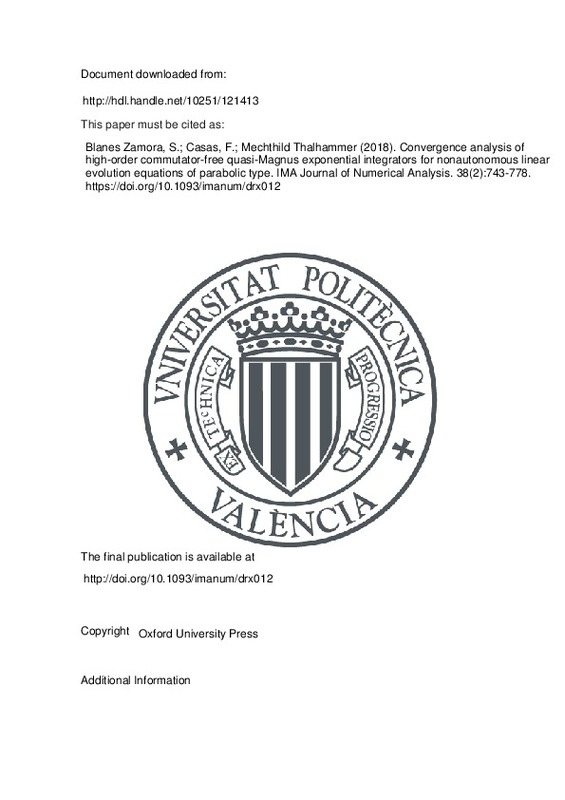JavaScript is disabled for your browser. Some features of this site may not work without it.
Buscar en RiuNet
Listar
Mi cuenta
Estadísticas
Ayuda RiuNet
Admin. UPV
Convergence analysis of high-order commutator-free quasi-Magnus exponential integrators for nonautonomous linear evolution equations of parabolic type
Mostrar el registro sencillo del ítem
Ficheros en el ítem
| dc.contributor.author | Blanes Zamora, Sergio
|
es_ES |
| dc.contributor.author | Casas, Fernando
|
es_ES |
| dc.contributor.author | Mechthild Thalhammer
|
es_ES |
| dc.date.accessioned | 2019-06-01T20:01:01Z | |
| dc.date.available | 2019-06-01T20:01:01Z | |
| dc.date.issued | 2018 | es_ES |
| dc.identifier.issn | 0272-4979 | es_ES |
| dc.identifier.uri | http://hdl.handle.net/10251/121413 | |
| dc.description.abstract | [EN] The main objective of this work is to provide a stability and error analysis of high-order commutator-free quasi-Magnus (CFQM) exponential integrators. These time integration methods for nonautonomous linear evolution equations are formed by products of exponentials involving linear combinations of the defining operator evaluated at certain times. In comparison with other classes of time integration methods, such as Magnus integrators, an inherent advantage of CFQM exponential integrators is that structural properties of the operator are well preserved by the arising linear combinations. Employing the analytical framework of sectorial operators in Banach spaces, evolution equations of parabolic type and dissipative quantum systems are included in the scope of applications. In this context, however, numerical experiments show that CFQM exponential integrators of nonstiff order five or higher proposed in the literature suffer from poor stability properties. The given analysis delivers insight that CFQM exponential integrators are well defined and stable only if the coefficients occurring in the linear combinations satisfy a positivity condition and that an alternative approach for the design of stable high-order schemes relies on the consideration of complex coefficients. Together with suitable local error expansions, this implies that a high-order CFQM exponential integrator retains its nonstiff order of convergence under appropriate regularity and compatibility requirements on the exact solution. Numerical examples confirm the theoretical result and illustrate the favourable behaviour of novel schemes involving complex coefficients in stability and accuracy. | es_ES |
| dc.description.sponsorship | Ministerio de Economia y Competitividad (Spain) through projects MTM2013-46553-C3 and MTM2016-77660-P (AEI/FEDER, UE) to S.B. and F.C. | es_ES |
| dc.language | Inglés | es_ES |
| dc.publisher | Oxford University Press | es_ES |
| dc.relation.ispartof | IMA Journal of Numerical Analysis | es_ES |
| dc.rights | Reserva de todos los derechos | es_ES |
| dc.subject | Nonautonomous linear evolution equations | es_ES |
| dc.subject | Parabolic initial-boundary value problems | es_ES |
| dc.subject | Dissipative quantum systems | es_ES |
| dc.subject | Exponential integrators | es_ES |
| dc.subject | Magnus integrators | es_ES |
| dc.subject | Commutator-free quasi-Magnus exponential integrators | es_ES |
| dc.subject | Stability | es_ES |
| dc.subject | Local error | es_ES |
| dc.subject | Convergence | es_ES |
| dc.subject.classification | MATEMATICA APLICADA | es_ES |
| dc.title | Convergence analysis of high-order commutator-free quasi-Magnus exponential integrators for nonautonomous linear evolution equations of parabolic type | es_ES |
| dc.type | Artículo | es_ES |
| dc.identifier.doi | 10.1093/imanum/drx012 | es_ES |
| dc.relation.projectID | info:eu-repo/grantAgreement/MINECO//MTM2013-46553-C3-3-P/ES/METODOS DE ESCISION Y COMPOSICION EN INTEGRACION NUMERICA GEOMETRICA. TEORIA Y APLICACIONES/ | es_ES |
| dc.relation.projectID | info:eu-repo/grantAgreement/MINECO//MTM2016-77660-P/ES/NUEVOS RETOS EN INTEGRACION NUMERICA: FUNDAMENTOS ALGEBRAICOS, METODOS DE ESCISION, METODOS DE MONTECARLO Y OTRAS APLICACIONES/ | es_ES |
| dc.rights.accessRights | Abierto | es_ES |
| dc.contributor.affiliation | Universitat Politècnica de València. Departamento de Matemática Aplicada - Departament de Matemàtica Aplicada | es_ES |
| dc.description.bibliographicCitation | Blanes Zamora, S.; Casas, F.; Mechthild Thalhammer (2018). Convergence analysis of high-order commutator-free quasi-Magnus exponential integrators for nonautonomous linear evolution equations of parabolic type. IMA Journal of Numerical Analysis. 38(2):743-778. https://doi.org/10.1093/imanum/drx012 | es_ES |
| dc.description.accrualMethod | S | es_ES |
| dc.relation.publisherversion | http://doi.org/10.1093/imanum/drx012 | es_ES |
| dc.description.upvformatpinicio | 743 | es_ES |
| dc.description.upvformatpfin | 778 | es_ES |
| dc.type.version | info:eu-repo/semantics/publishedVersion | es_ES |
| dc.description.volume | 38 | es_ES |
| dc.description.issue | 2 | es_ES |
| dc.relation.pasarela | S\380587 | es_ES |
| dc.contributor.funder | Ministerio de Economía y Competitividad | es_ES |







![[Cerrado]](/themes/UPV/images/candado.png)

